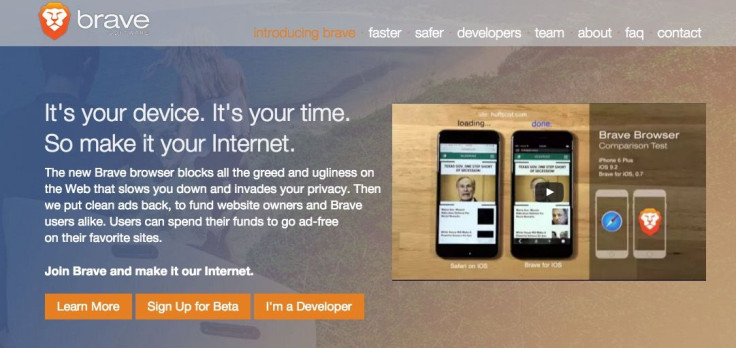Mozilla Co-founder Brendan Eich has unveiled a new ad-blocking browser called Brave that he says is aimed at “fixing the web,” by blocking all ads and then, oddly, inserting ads of its own.
Eich offers this new browser as a kind of solution to one of the largest controversies concerning the web: ad-blocker use.
While most of us begrudgingly acknowledge the need for ads to support web content, few of us appreciate the intrusive role they play in breaking up the flow, distracting from the message and slowing down web page load times. In recent years, however, ads have become more than just annoyances. They are now a growing source of malware infection for both desktop and mobile users. Multiple stories broke in 2015 about reputable websites delivering malware to visitors via poisoned ad campaigns, which has led to the increased use of ad-blockers by web users.
While ad-blockers seem great to users there is an ongoing ethical debate about how they should be applied to web content. While the common sense reasons to use an ad-blocker are about an uninterrupted and speedier browsing experience, there has been increasing controversy regarding the practice. As any digital media provider knows, ads play an integral role in their economic success. There’s no free lunch, especially on the web, and one of the reasons the web is able to provide users with content at no cost is largely due to that content being supported by ads.
The debate over ad-blockers intensified in September when Apple announced iOS 9 would provide support for ad-blockers on the mobile Safari browser. Many developers launched ad-blockers in the Apple store when the new firmware released. One in particular – Peace – emerged as the very best experience for users and became incredibly popular. Interestingly, however, the creator soon pulled the ad-blocker from the Apple app store on the basis of ethics, stating that he “didn’t feel good” about taking away the source of content provider’s paychecks.
The ethical dilemma over whether or not to use an ad-blocker stems from an unsolved problem of how advertising is implemented on the Web. It is a problem Eich considers to be the biggest threats to web users.
“Some call it advertising, others privacy. I view it as the Principal-Agent conflict of interest woven into the fabric of the Web,” said Eich in a press release about Brave.
To resolve this conflict of interest, Eich proposed his new Brave browser which is designed to “avert the war” between users and content providers by policing the ads served at a browser level.
“We are building a new browser and a connected private cloud service with anonymous ads. Today we’re releasing the 0.7 developer version for early adopters and testers, along with open source and our roadmap,” Eich wrote.
With the specifics of how the system actually works still a bit murky, it appears Brave will block every form of ad that is on the web but then inserts its own kosher ads – potentially from the same advertisers. Brave will choose the ads to serve users based on their local browsing history instead of via cookies that follow them on the web. The method is intended to be less of a privacy invasion. However, in serving those ads, Brave will take a 15 percent cut of the revenue from advertisements.
While the idea of a browser that offers a cleaner, safer and faster browsing experience sounds pretty attractive, whether or not Brave can deliver what it's promising, or if the solution is actually something web users will want, is debatable says web security specialist Troy Hunt .
“I can't see it getting traction,” Troy told iDigitalTimes. “Do we need another browser at all, let alone one that modifies the pages you load and is from Brendan Eich? Memories of his Mozilla exit are still raw and combined with everything else, I just can't see it getting up there.”
Hunt isn’t the only one with doubts about Brave. Ars Technica writer Sebastian Anthony went so far as to say Brave sounded like nothing more than a “cash-grab.”
“It's one thing for a Web browser to block ads by default, but quite another for that Web browser to insert its own ads and generate revenue in the process,” Anthony wrote.
Meanwhile, Christopher Boyd , a Malware Intelligence Analyst at Malwarebytes voiced concerns about the “workability” of the browser.
“While the concept of a browser battling Malvertising is a sound one, it remains to be seen if switching out one set of adverts for another is workable. If a Malvert is served up just once by Mozilla's replacement adverts, it will call the whole project into question,” Boyd told iDigitalTimes.
In addition, Boyd notes that launching an ad-defying project like Brave could also ensnare the browser in a tangle of legal battles with advertisers.
“Over the years, we've seen Adware vendors go to war with one another due to some programs uninstalling the other - and there's a long list of advertisers going to court with ad blockers. It's possible we could see advertising vendors bringing out the legal big guns for what they may see as a direct attempt to reduce their revenue stream,” he said.
The beta version of Brave’s browser is available now to those who want to try it out. It requires visiting the site and signing up for the beta program, after which instructions are sent for installing and using the new browser.


















